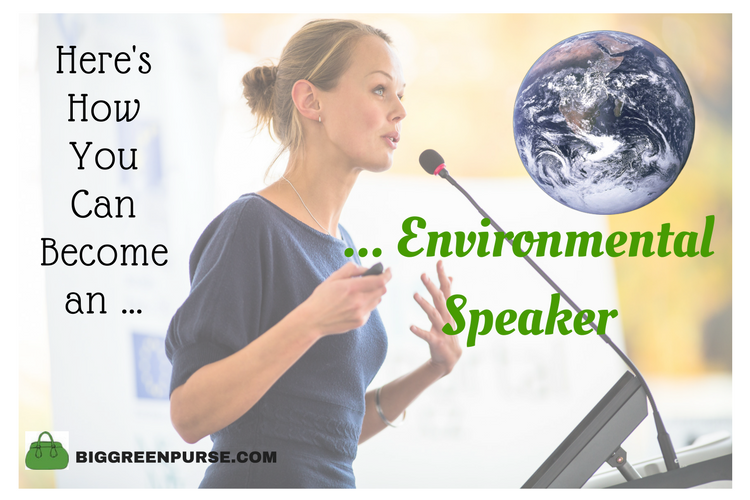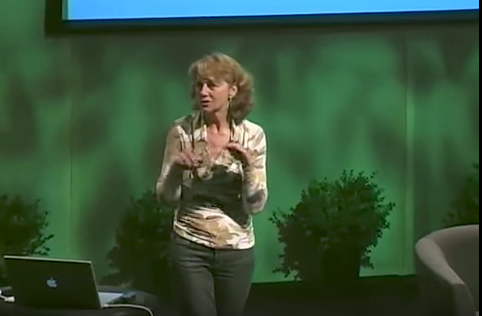
You care about the environment: the air you breathe, the water you drink, wild places you love. You want to protect the Earth for you, your family, and future generations. So… you vote. You send emails to elected officials and write Facebook posts to explain the issues to your community. You support organizations that are working on public policy. You donate. And maybe you get a job working for an environmental organization. But that still doesn’t seem like enough. What else could you do? Why not think about launching an environmental speaking career?
Becoming an environmental speaker can be empowering and highly rewarding.
It’s an effective way to counter the fake news that seems to be dominating social media.
It gives you a chance to set the record straight on a wide range of environmental issues that people need to learn more about.
It also is a great means to establish your own credibility and expand your social network so you can have greater impact in all the work you do. By using your knowledge and passion, you can instill a sense of responsibility in others.
This is what keynote speakers do all the time. They provide insight into a subject, and motivate and inspire an audience. You could do that, too!
We’re partnering with ICMI, an international speakers bureau, hopefully to motivate you to launch an environmental speaking career.
Why the environment needs to be the focus of attention
Many major environmental concerns require serious attention, including
- Pollution caused by everything plastic, toxic heavy metals, and oil slicks.
- Global warming and climate change due to burning fossil fuels like coal and oil and the emission of carbon dioxide and other greenhouse gases.
- Overconsumption, which reduces the natural resources available to meet our needs for clean air, clean water, building and manufacturing materials, and even food.
- Disposal of waste, which causes additional pollution issues.
- Extinction of animal and plant species due to development, climate change, pollution and exposure to toxic chemicals.
- The specific issues that threaten your own community.
How keynote speaking can help
When you choose to speak out, a wide variety of venues become available to you: State and local conferences of groups you belong to. Events at churches, temples and other places of worship. Earth Day celebrations. Political conventions. Local garden clubs, organizing committees, and civic associations. The PTA. Business roundtables and monthly lunch meetings. County and state fairs. All of these gatherings provide a captive audience you can motivate to act.
As a keynote speaker, you can use your knowledge and concern to build support for your cause and encourage more people to participate in being part of the solution.
Becoming a keynote speaker also means that you will be invited to attend events where you can meet like-minded people of influence. It’s an excellent way to network and build your base of support.
Even if you don’t want to be a keynote speaker per se, you can facilitate workshops or be a panelist.

I’ve done all three – keynote, facilitate, and serve on panels – and they’ve all turned out to be very worthwhile ways to build momentum around important issues, sign up more subscribers to my newsletter, expand my social network, and generate enthusiasm for my cause.
You may think that actions speak louder than words, and that can be true. But, a good speaker can motivate many people to take action. Your voice can be a powerful tool, if you know how to speak with impact and conviction.
Here’s How to Launch Your Environmental Speaking Career
1. Make a list of the topics on which you have a particular expertise. You’re better off focusing on a specific category rather than being too general (e.g., being an expert on native plants that grow in your region might be more marketable than being someone who generally knows a bit about flowers).
2. Identify organizations, companies, and other institutions that convene annual events in or near the region where you live. Determine which ones would be appropriate to approach for a speaking engagement.
3. Develop a “pitch” package that includes two or three ideas for speeches you could give. Tailor your package to the individual interests of the groups you’re reaching out to.
4. Develop a biographical profile of yourself that establishes your credibility to speak on the topic you propose.
5. Contact the organization, send your pitch package, and follow up by telephone.
6. Prepare your speech and practice it in advance. Use notes if you can, rather than read straight from a written speech to come across as more personable and a true expert.
7. Deliver your speech. Voila! You’re a speaker!
Of course, if you really want to become a professional speaker, you’ll have to market yourself so people know who you are and why they should hire you. That’s what ICMI does for its clients. Check out the Health, Lifestyle & Well-being speakers on its website to get a sense of how to put together a profile for yourself, along with other marketing materials to send out when you’re looking for speaking opportunities.
Note: Our content partners help us bring you the expertise you need to lead the greener life you want. Our editorial opinion remains our own.















2 thoughts on “How an Environmental Speaking Career Can Help You Protect the Planet”
Very interesting thought, thank you!
You’re very welcome.
Comments are closed.